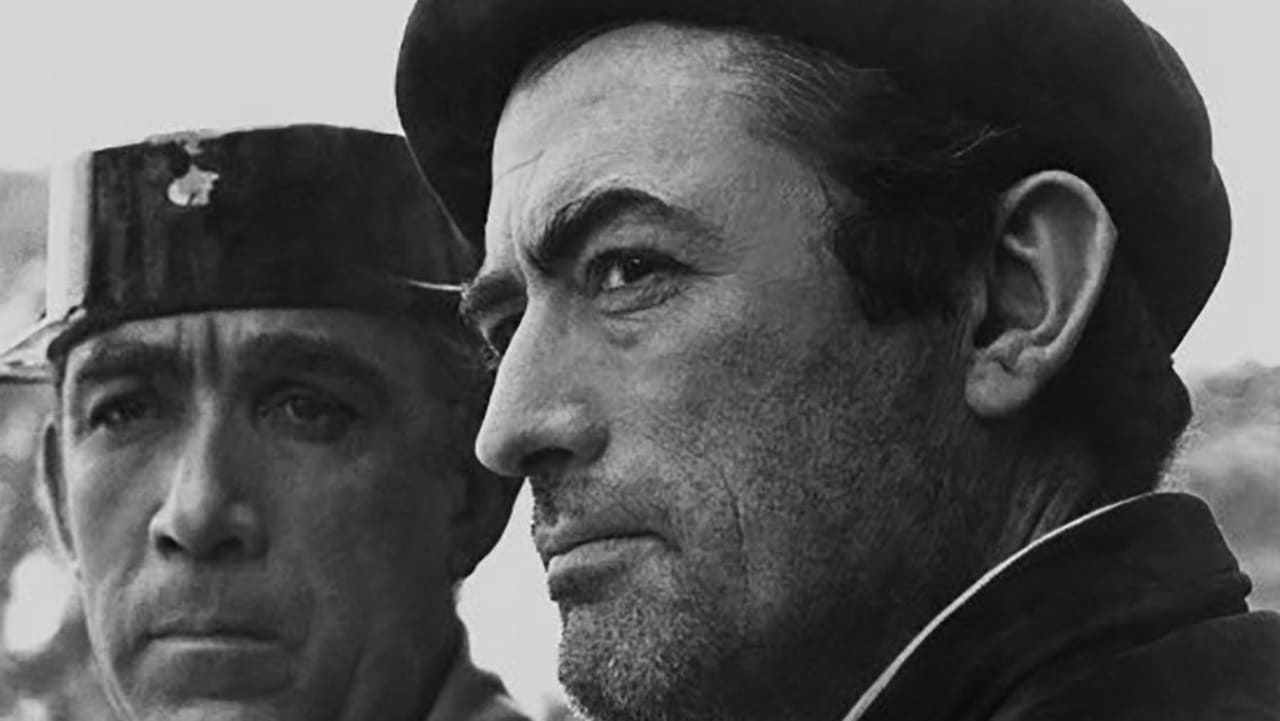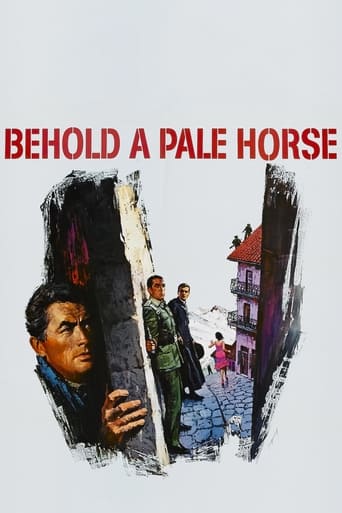

This movie reminded me a bit of "The Third Man," where there are a lot of street scenes that lead you places you do not expect. It is not nearly as brilliant or satisfying as "The Third Man," but it is interesting and surprising. The biggest surprise is the intensity of Gregory Peck as guerrilla leader Manuel Artiguez. He is a defeated Spanish Partisan who has continued to fight for twenty years after the Spanish Civil War ended. Peck slowly realizes that his importance as a symbol of resistance is more important than his life, and his only chance for victory.Omar Sheriff and Anthony Quinn are fine as a priest and police chief, but their characters are pretty straightforward. It was interesting to watch Quinn prayer to God to help him catch Artiquez. Usually antagonists get to kick a dog so that the audience knows that hes the bad guy. Here the director Fred Zinnemann doesn't stack the deck and allows the audience to decide who is morally right or wrong. A director who treats his audience with respect and assumes they are intelligent, is quite unusual and should be treasured.The only thing I didn't like about the movie was the cinematography. It was sometimes underexposed and muddy. Back in the film days, there would be a final timed print, with each scene getting its own exposure based on its density. It seems as if the print was not timed, or not timed well.Also, the viewer should be warned that there is very little action in the film. The movie focuses on the psychology of the characters, so don't expect "the Guns of Navarone."
... View MoreWow, this film has some odd casting. Although the people in the film are supposed to be Spanish, none of the major actors in the film are from Spain. The weirdest casting was Gregory Peck. Gregory Peck?! At least Anthony Quinn kinda looks Spanish (heck, he's played just about every nationality there is plus half his background is Mexican). And having Muslim-convert Omar Sharif playing a Spanish Catholic priest...! All this is really strange and it's a shame they didn't let any Spaniards play these roles. Now part of this could be because Franco did NOT like the film and probably wouldn't have allowed anyone living in Spain to be in the film. But surely there must have been some expatriates or at least people who seemed more Spanish than Gregory Peck. He was a wonderful actor, certainly, but here he was badly miscast...as was Sharif.The film begins with a quick summary of the Spanish Civil War in the 1930s. At the end, when the Republican forces lost, the surviving fighters are shown turning in their arms and immigrating to France. However, Peck's character refuses to give up the fight and apparently spent the next 20 years making violent incursions into his native land. For this, he is now a wanted criminal--not just an ex-Republican soldier.Now, after 20 years, Peck is living in France and his mother back in Spain is dying. Police chief Quinn now plans to use this approaching death as a chance to lure Peck into a trap. Now considering that Peck has killed and robbed rather senselessly since the war ended, he does deserve to be captured, so in some ways you actually are rooting for the Fascist police to capture him. An interesting twist, as Americans in general were pro-Republican (or ambivalent).The problem is that when Peck doesn't fall into the trap right away AND his mother dies, Quinn needs to keep this a secret--otherwise the plan will come to nothing. But, unknown to Quinn, young priest Sharif has inexplicably agreed to take a message to Peck from his mother in the hospital that warns him of the trap. Now considering that the woman had refused the last rights and cursed God, it is confusing why a priest (and they were mostly pro-Nationalist/Franco) would take the trouble or risk to help. This is, by far, the biggest flaw with the film. His motivation for this was confusing--helping an Atheist to send a message to her Atheist son who is a wanted criminal and killer. Plus, what if priest-hating Peck just decides to kill him?!As far as Peck goes, as least his role is interesting. He is not sympathetic (considering his post-war record) and he's incredibly nasty at times to the young boy in the film. He slaps the kid and tells him to get lost. This is NOT Atticus Finch (TO KILL A MOCKING BIRD) or Ezra Baxter (THE YEARLING)!! I can commend Peck for being willing to play such an unlikable guy. And, the film is interesting in how it takes this child's hero-worship of Peck and quickly erodes it.The problem is, for many, with the Franco government (they're bad, m'kay?!) and a violent criminal who lost sight of his once commendable cause, you are left wondering who to root for in the film. For some, this isn't a problem and for others, like myself, I really didn't care about the characters so I was left feeling disconnected and ambivalent.Now it is well made and well directed, but it's still a film I'd rather have not seen. With so many films out there, I could have easily done better.
... View MoreIt wasn't all hysteria. There were Communists and Communist sympathizers in the movie business. Several were involved one way and another in the making of this didactic film. This picture with its heavy political message about the backwardness and repression in Spain under Franco could never have been made in the United States although two American actors share top billing.There is some fine acting here but not by Gregory Peck. He does not make a convincing European. Nor does the brutishness of his character fit the man of integrity audiences had come to expect this great star to portray. On the other hand, the restrained performance by Anthony Quinn makes his **Guardia** captain the most complicated and interesting character in the movie. Unlike his adversary, this man has no illusions. He knows he serves a regime that rules by fear though he is outwardly courteous to everyone. A married man, the address and telephone number of his mistress are common knowledge at police headquarters. Yet he prays with apparent sincerity to the Virgin for success in the upcoming confrontation. You really wish there were more of him but he has little screen time--one of the movie's major faults.Big, handsome Christian Marquand from Marseilles, France is outstanding as Quinn's able and tactful lieutenant, and as Pilar, mother to Peck's character and an unreconstructed, anticlerical leftist, American Mildred Dunnock is remarkably convincing in a small role. Having been brought **in extremis** to the local hospital, she sends a priest who has come to her bedside away with the suggestion he "go and bless the rifles in the firing squad".The documentary footage of the pilgrimage site at Lourdes, France is a gratifying bonus, along with some impressive shots of the Pyrenees. In truth, the cinematography is first rate throughout, a Fred Zinneman trademark.The shortcomings in the film center around the screenplay. There is too much talking as many others here have remarked, the movie is tedious in places and about fifteen minutes too long. The device of having much of the action viewed through the eyes of a child simply doesn't work.Many have noted that Peck and Quinn had appeared together in the 1959 blockbuster "The Guns of Navarone". Along with composer Maurice Jarre, several actors from "Lawrence of Arabia" are reunited in this picture, also. There is Quinn, Omar Sharif as a priest facing a moral dilemma and in an odd bit of casting, Anglo-Pakistani Zia Mohyeddin. He plays a guide--the same role he had in "Lawrence" but this time he survives.
... View MoreWhen the Spanish War was finished, winners devoted to go after anybody who reflected the red light of the communism or any other color they dislike. On the other hand, few guerilla fighter continued his actions against the winners. But their strength was lower every time. One of this guerrilla was Valentin González "el campesino", which figure is portrayed in this film in a free form (not in an historical form).Twenty years after the Civil war conclusion, the Spanish police has a good option to capture one of these ex-combatants, who was in exile in France. The description of the methods and day-to-day life of the Spanish police could be the reason which explains that the Spanish Government forbade any more Columbia's film in Spain.You need no knowledge about the twenty Century Spain's history to understand the film, although you can enjoy more it if you know something. In fact, the film put in a specific political situation the psychological confrontation between two men. It could be a good exercise to understand the motives which impulse his actions.
... View More